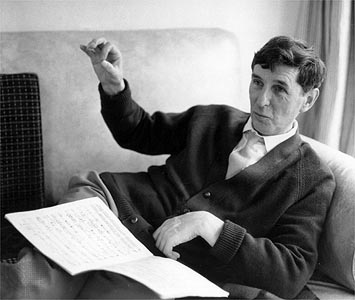Tippett’s “A Child of Our Time” makes moving impact on a stormy night
If last season’s Plans and Friday night’s A Child of Our Time are any indication, Chicago’s mercurial weather gods are not oratorio devotees.
As with the sopping premiere of the Michael Torke commission last summer, at conductor Christopher Bell’s downbeat, large droplets sent much of Millennium Park scurrying home, abandoning the lawn and three-quarters of the Pavilion. Huddled under an assortment of ponchos and quivering umbrellas, those undaunted by the pounding rain were rewarded with an alternately rousing and philosophically introspective performance of Sir Michael Tippett’s landmark score.
From the opening brass dissonances and lower-string descent, it is clear we are in the territory of Benjamin Britten and William Walton, contemporaries of Tippett, and that this is no cheery summertime fare.
With thoughts of penning an operatic work, the English composer was furnished his subject with the shooting death of Nazi official Ernst vom Rath by Polish ex-pat Herschel Grynspan inside the Parisian German embassy. Refused French citizenship, the seventeen-year-old Polish Jew had been living in constant fear of deportation. With his family corralled into a refugee camp on the border, the overwhelmed Grynspan entered the embassy and assassinated vom Rath, setting off the destruction of Jewish businesses and savage mob-killings of 91 German and Austrian Jews in what came to be referred to as “Kristallnacht.”
Tippett, himself a conscientious objector famously jailed during the war for his pacifism, does not limit himself to simply retelling the tragedy of Grynspan, but instead uses it as a microcosm and analogy of inhumanity and oppression throughout history. Structured in three parts like Handel’s Messiah, Tippett’s canvas also turns to Bach’s Passions for inspiration. Searching for a parallel to his predecessor’s chorales, Tippett uncovered the artistic crux of this oratorio with the African-American spiritual.
A Child of Our Time is not an expertly orchestrated score, with a frequent reliance on rhythmic unison and density of instrumentation that at times borders on the pedantic, such as the meandering Chorus of the Oppressed. This led to much of the text being unintelligible without a libretto, with the exception of the lovely vocal narration of John Relyea’s dark-chocolate bass-baritone. Compositional issues aside, conductor and Grant Park Chorus Director Christopher Bell admirably navigated the capacious choir through fleet passages such as the rhythmically agitated Burn down their houses!
Like the composition itself, the musicians brimmed up into an iridescence during the spiritual-inspired choruses. Go Down Moses is unequivocally the pinnacle of the piece, stretching the well-known slave song into a grand call-and-response between an emphatic bass-baritone and a proud, quietly-majestic congregation of voices as French horns interweave an unexpected counterpoint. Along with Steal away to Jesus, Nobody knows the trouble I seen and Deep river, Tippett’s reconfiguration of these well known melodies overshadows any deficits in the surrounding staves, and it should come as no surprise that they are often performed apart from the oratorio as a suite.
Unlike the Handel, the solo movements of Child do not stand alone, and perhaps the result of Tippett’s philosophical leanings, combine to form more of a Jungian “collective unconscious.” That said, soprano Jonita Lattimore shone with the restraint of the emotional pain in movements such as A Spiritual: O, by and by, her leaping fourths turned thoughtfully inward. Mezzo-soprano Anita Krause and the titular Child, tenor Garrett Sorenson were equally admirable in allowing the tragedy to speak for itself.
For a string section likely struggling with the effects of soapy humidity on bow hair, dripping embouchures in the winds and a quartet of soloists sweating through their gowns or shirts in the swelter of a July night, it was most impressive to watch the musicians perform as though the Prizker Pavilion was not largely empty. Any audience members deterred by the lightning and thunder would do well to wring out those socks and head back to Millennium Park tonight.
A Child of Our Time will be repeated at 7:30 p.m. Saturday. www.grantparkmusicfestival.com.
Violist of the newly formed Spektral Quartet, Doyle Armbrust is principal violist of Camerata Chicago and the Firebird Chamber Orchestra in Miami, as well as a core member of the Chicago Symphony Orchestra’s MusicNow Series and the Anaphora, New Millennium Orchestra and Accessible Contemporary Music ensembles. When not touring with Corky Siegel’s Chamber Blues, he will likely be found scribbling in a notebook at the back of the City’s indie rock and classical venues as writer for TimeOut Chicago, or feverishly working on an upcoming theater collaboration with the love of his life, playwright Laura Schellhardt.
Posted in Performances
